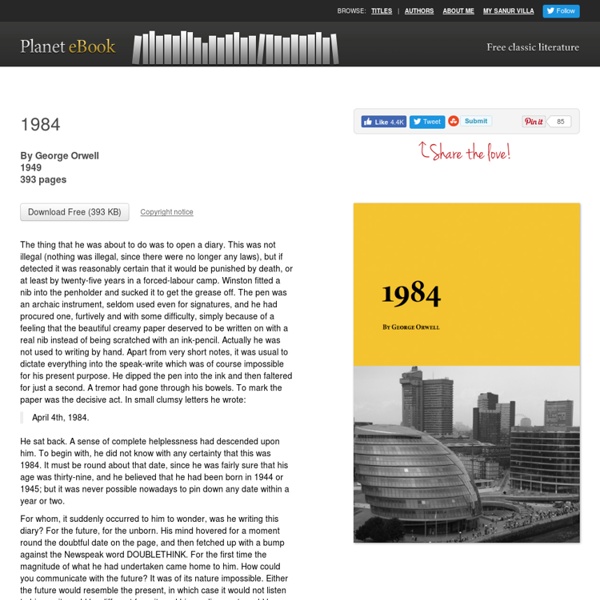1984 - Download Free eBook
The thing that he was about to do was to open a diary. This was not illegal (nothing was illegal, since there were no longer any laws), but if detected it was reasonably certain that it would be punished by death, or at least by twenty-five years in a forced-labour camp. Winston fitted a nib into the penholder and sucked it to get the grease off. The pen was an archaic instrument, seldom used even for signatures, and he had procured one, furtively and with some difficulty, simply because of a feeling that the beautiful creamy paper deserved to be written on with a real nib instead of being scratched with an ink-pencil. Actually he was not used to writing by hand. Apart from very short notes, it was usual to dictate everything into the speak-write which was of course impossible for his present purpose. April 4th, 1984. He sat back. For whom, it suddenly occurred to him to wonder, was he writing this diary? For some time he sat gazing stupidly at the paper.
6 News Stories to Connect to Orwell’s 1984
Big brother really is watching you. Today we accept a certain amount of oversight by government and business as a part of daily life. Students know about all the surveillance cameras that follow them as they move about in the world. They realize the U.S. government tracks details on their income and health. They know that online vendors know what they buy and everything they looked at before they decide. Still, they can bring a skepticism to class when they read George Orwell’s 1984. Several recent news stories may make the answer to that question less certain. Someone’s watching Granny cook her eggs. Student discussion of the articles can be guided with these questions: What freedoms or privacy rights does the system affect? If students read and discuss several of the articles, additional questions can ask them to compare and synthesize the pieces: Notice that the targets of these programs are either students or senior citizens. [Creative Commons licensed Flickr photo by anarchosyn]
1984 (roman)
Mil neuf cent quatre-vingt-quatre L'histoire se déroule dans un futur imaginaire. L'année en cours est incertaine, mais on pense qu'il s'agit de 1984. Le protagoniste, Winston Smith, est un employé assidu de niveau intermédiaire au ministère de la Vérité qui déteste secrètement le Parti et rêve de rébellion. Le résumé qui suit utilise les noms et expressions proposés par Amélie Audiberti, première traductrice en France du roman. Winston Smith, 39 ans, habitant de Londres en Océania, est un employé du Parti extérieur, c'est-à-dire un membre de la « caste » intermédiaire du régime océanien, l'Angsoc. Toutefois, contrairement à la majeure partie de la population, Winston ne réussit pas à se fondre dans cette amnésie collective[pas clair] et ne peut donc adhérer aux mensonges du Parti. Winston Smith servira également de prétexte dans la suite du roman pour exposer la société totalitaire qui l'entoure, les hommes qui y collaborent et ses ressorts les plus impitoyables. — George Orwell
Lesson Plan: Updating Orwell's '1984'
Overview | How does George Orwell’s vision of technology and its uses in “1984” compare with today’s reality? How have concerns about privacy and freedom expressed in the novel been manifested in the contemporary world? In this lesson, students compare and contrast the world, people and technologies of “1984” with those of today and create a treatment for a modern film, print or stage adaptation that revolves around current technologies. Materials | Full text of “1984,” computers with Internet access, software for podcasting and projection equipment, copies of the handout “1984” vs. Warm-Up | Give students the following list of words from “1984”: Big BrotherdoublethinkthoughtcrimeNewspeakmemory holeOrwellian Students who have read the novel will recognize their provenance and should define them, as well as give a contemporary example of something that could be described similarly. Finally, ask: How does technology enable people to violate others’ privacy and freedoms? What does Mr.
Newspeak Dictionary
Newspeak Dictionary Newspeak and other terminology found in Orwell's novel "1984", with some additional words which only appear in the movie. Airstrip One - Formally called England. artsem - Artificial Insemination - The government is pushing this method of childbirth as the ONLY method, to aid in the destruction of the family unit. Atomic Wars - The Atomic Wars took place during the 1950's. It was out of the chaos of these wars that Party emerged and seized control. Big Brother - Also refered to as simply "B.B.". And just like the gods of most religions, Big Brother is most likely fictional. "The story really began in the middle sixties, the period of the great purges in which the original leaders of the Revolution were wiped out once and for all. But this really doesn't answer the question of whether Big Brother is a 'real' individual or not. "Nobody has ever seen Big Brother. It also fits the ideology of Ingsoc to have a fictional leader. bellyfeel - Full emotional understanding.
Related:
Related:



